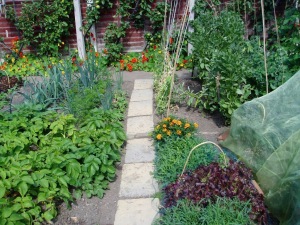One of my most rewarding pastimes at the moment is growing my own vegetables. It’s so exciting to see a seedling poking its head out of the earth, and wonderfully satisfying to eat something freshly picked from your own garden. I spend more time just looking at the veg garden, absorbed in the wonders of how nature develops, seeing what’s grown or started flowering since the last time I looked, than I actually spend working on it. I also love to give any excess produce away, I feel useful and productive and I get a lot out of the act of giving. I’m lucky though, that I have help. I do, more or less, manage the veg plot on my own, but if I’m struggling I know I can call on others to do anything I can’t manage. So here are my tips for growing your own safely:-
- Aim for relaxed effortlessness at all times. Make sure everything you do is easy. Don’t take on anything that might involve an effort!
- Start small. Start with a few pots that you can get to easily. If you’ve never grown anything before rocket and radishes are a great way to start as they grow really quickly and require very little patience. If you don’t have help try not to grow anything that will need too big a pot, otherwise you’ll need a big bag of compost which will be heavy and difficult to move.
- Enlist help; get your family and friends involved. Explain how therapeutic it could be for you but that you probably can’t do it all alone.
- Tackle a weed as soon as you see it. If you put off weeding until you have time to do it properly they might just take over before you find the energy. Whilst I’m lovingly contemplating my veg plot I act straight away if I see a weed, even when I’m not intending to do any gardening. That way it never builds up into a big job. If it has become a big job, get some help to get on top of it, so that a little by little approach becomes possible again.
- Invest in a gardening stool/ kneeling pad. Make sure you’re comfortable. If you can get someone to build you some raised beds even better, it’s good to keeping your head above your heart whist you work if you can.
- Have a small watering can (or only ever fill a big one half full). Making several trips with something easy to carry is going to take less out of you than fewer trips that involve effort.
- Change activities regularly, don’t try to do anything all at once. If you want to transplant some seedlings for example, just do a few of them, then take a break and work on something else that involves a different position and different muscles.
- If you are prone to lose all track of time whilst emerged in an enjoyable activity, set the timer on your phone to make sure so don’t spend too long doing any particular task.
- Avoid having goals for what you want to accomplish today. I have a list of what I think needs doing and every time I feel like doing a bit of gardening I think ‘what could I do a bit of right now?’ After I’ve done a little bit of something I have a rest and then ask myself if I feel like doing a little bit of something else. Always listen to your body before you listen to the garden!
- It doesn’t matter if you miss something, or something goes wrong. It can all go on the compost heap and help next year’s crop instead. If you didn’t get round to sewing something in time perhaps there’s a later crop you can sew instead. The crop is only a small part of the benefits of gardening, enjoy the process and don’t get too attached to the results! I’m sure there will be many rewards whatever happens!
- Don’t get too wound up by your competitors. The birds and the bugs are only trying to survive; we’re just trying to improve our quality of life! Rise to the challenge of pitting your wits against their instincts, but don’t take it too seriously if they win some of the battles!
Do you have any tips for how to keep gardening safely within your ability?






